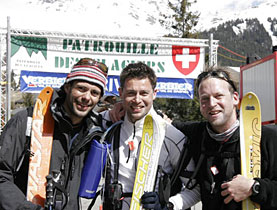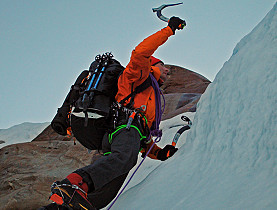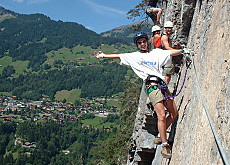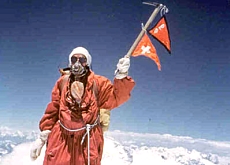British team survives gruelling mountain race

"It was one of the most amazing but horrible experiences of my life," said Toby Cox, captain of Patrouille des Glaciers patrol number 38.
On Saturday his three-man British team completed the mythical long-distance ski-mountaineering race from Zermatt to Verbier, battling freezing temperatures, fog, high winds and 3,000-metre passes.
Their team was one of 1,412 patrols from 22 countries taking part in the biennial competition organised by the Swiss army, said to be one of the most challenging in the world.
“It’s unique due to its length, difficulty and altitude – ascending and descending 8,000 metres over 110 kilometres,” race organiser Commander Marius Robyr told swissinfo.
If that is not enough, the teams have to start at night and are roped together during the trickiest parts of the course.
“I can’t quite believe we’ve been classified – it’s unreal,” said Cox, who works as a lawyer in Paris.
Patrol 38, whose other members were Alex Nelstrop, a flour miller from Cheshire, and Russell Berry, a legal adviser from London, arrived in Verbier after an epic adventure lasting just over 18 hours.
Although they finished 212th out of the 329 teams that set off on Friday, 12 hours behind the winners, a Swiss team who powered their way to the finish line in six hours 24 minutes, the British patrol is ecstatic.
As relative newcomers to ski mountaineering, they set out to “push themselves” and to arrive in Verbier in one piece.
“The fact that we finished shows that recreational skiers can do it, but it was no picnic,” said Cox, who was nursing “appalling” blisters.
Unforgettable
The 13th Patrouille proved to be one of the most unforgettable.
Leaving Zermatt on Friday night with the Matterhorn hidden in a blanket of cloud, the roped, torch-lit teams climbed in the dark to the highest point of the course, Tête Blanche, at 3,650 metres.
There they were met by fog, swirling 70-kilometre winds and temperatures of minus 25 degrees Celsius, which caused eight patrols to abandon.
Before the send-off, Robyr had told participants to expect particularly difficult weather conditions and to pack plenty of warm clothing.
“The Patrouille des Glaciers is not a fair-weather race,” he warned at his last briefing after 18 years in charge.
A first group of competitors that left on Wednesday had not been sufficiently prepared for the freezing, stormy conditions, which left 22 of them in hospital for frostbite. Friday, the situation was not much better.
“We didn’t expect the weather to be so bad – it snowed for almost 11 hours solid,” admitted Cox.
Non-stop action
Although they started well and managed the tricky roped descent through fog and rocks to the halfway point, Arolla, in good time, things suddenly went horribly wrong when one of Nelstrop’s climbing skins flew off. Fortunately, some good old-fashioned duct tape saved the day.
But from then onwards the team found themselves under time pressure to reach the next control points and avoid disqualification.
“It was 18 hours non stop; there was little time to have a rest or even get food out,” explained Cox.
Refusing to give up and fuelled by gels, chocolate bars, welcome cups of tea as well as “overwhelming” local support, the patrol scraped through each control point in the nick of time before arriving in Verbier in brilliant sunshine just after 4pm.
“I’ve never done anything like it,” said the patrol leader afterwards. “It’s like going up Snowdon [Wales’ highest peak] seven times or doing five days of the “Haute Route” [between Zermatt and Chamonix] in one day.”
So had they been ill prepared for the mountainous challenge?
“We did a lot of sport – long-distance running, cardio work, swimming and some ski touring beforehand. But it’s hard when you are not in the mountains,” said Cox.
Another British competitor, Nick Wallis, from Sheffield, agreed.
“You really need to be based here to train as we don’t have the mountains or snow in the UK. We do the best we can while admitting that we’ve got one hand tied behind our backs from the start.”
But patrol 38’s enthusiasm for the race remains undiminished.
“When we finished each of us said we’d never ever do it ever again, but memories fade and the morning after, we now realise that we probably will,” laughs Cox.
swissinfo, Simon Bradley in Zermatt and Verbier
The 13th Patrouille des Glaciers took place from April 16-20.
The biennial ski-touring race, organised by the Swiss army, is one of the toughest in the world. There are two courses: the main one -110 kilometres from Zermatt to Verbier, with some 8,000 metres of climb – and the shorter B course (50 kilometres) from Arolla to Verbier.
Some 1,412 teams, each comprising three members – a total of 4,236 participants – took part this year.
70% came from French-speaking Switzerland, 13% from German-speaking regions, 1% from Italian-speaking regions, and 16% from abroad.
The Swiss team comprising Florent Troillet, Alexander Hug and Didier Moret, won the 13th event in a time of six hours and 24 minutes, the first by a Swiss team in eight years, and only six minutes shy of the record set in 2006.
The Swiss women’s team made up of Nathalie Etzensberger, Gabrielle Magnenat and Séverine Pont-Combe smashed the course record arriving in a time of 7 hours and 53 minutes.
The race dates back to the Second World War. Two Swiss army captains, Rodolphe Tissières and Roger Bonvin, came up with the idea of a high-altitude race to test their troops.
Eighteen teams took part in the first race in April 1943 from the Schönheit mountain hut, near Zermatt, to Verbier. During the early races, participants had to carry their army-issue weapons and shoot at a target on arrival or were liable to a penalty.
Following a terrible accident during the third event in 1949, when a patrol fell into a crevasse on the Mont Miné glacier, the event was banned for over 30 years.
Since the Patrouille des Glaciers was relaunched in 1984, it has been cancelled twice due to bad weather and avalanche risks (1986 and 2002). It now takes place every two years.

In compliance with the JTI standards
More: SWI swissinfo.ch certified by the Journalism Trust Initiative




You can find an overview of ongoing debates with our journalists here. Please join us!
If you want to start a conversation about a topic raised in this article or want to report factual errors, email us at english@swissinfo.ch.